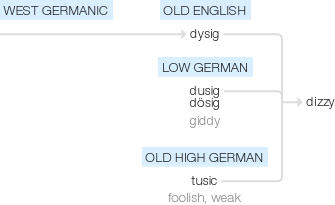Dizzy
Old English dysig ‘foolish’, of West Germanic origin; related to Low German dusig, dösig ‘giddy’ and Old High German tusic ‘foolish, weak’.
wiktionary
From Middle English disy, dysy, desi, dusy, from Old English dysiġ, dyseġ(“dizzy; foolish; unwise; stupid”), from Proto-Germanic *dusigaz(“stunned; dazed”). Akin to West Frisian dize(“fog”), Dutch deusig, duizig(“dizzy”), duizelig(“dizzy”), German dösig(“sleepy; stupid”).
dizzy (plural dizzies)
etymonline
dizzy (adj.)
Old English dysig "foolish, stupid" (obsolete in the original sense except in dialect from 13c.), from Proto-Germanic *dusijaz (source also of Low German düsig "dizzy," Dutch duizelen "to be dizzy," Old High German dusig "foolish," German Tor "fool," Old English dwæs, Dutch dwaas "foolish"), perhaps from PIE *dheu- (1) "dust, vapor, smoke; to rise in a cloud" (and related notions of "defective perception or wits").
Meaning "having a whirling sensation" is from c. 1400; that of "giddy, thoughtless, heedless," is from c. 1500 and seems to merge the two earlier meanings. Used of the "foolish virgins" in early translations of Matthew xxv; used especially of blondes since 1870s. Related: Dizzily.
dizzy (v.)
Middle English dusien, from Old English dysigan "do unwise or foolish things," from the source of dizzy (adj.). Sense of "to make to have a whirling sensation" is from c. 1500. Related: Dizzied; dizzying.
